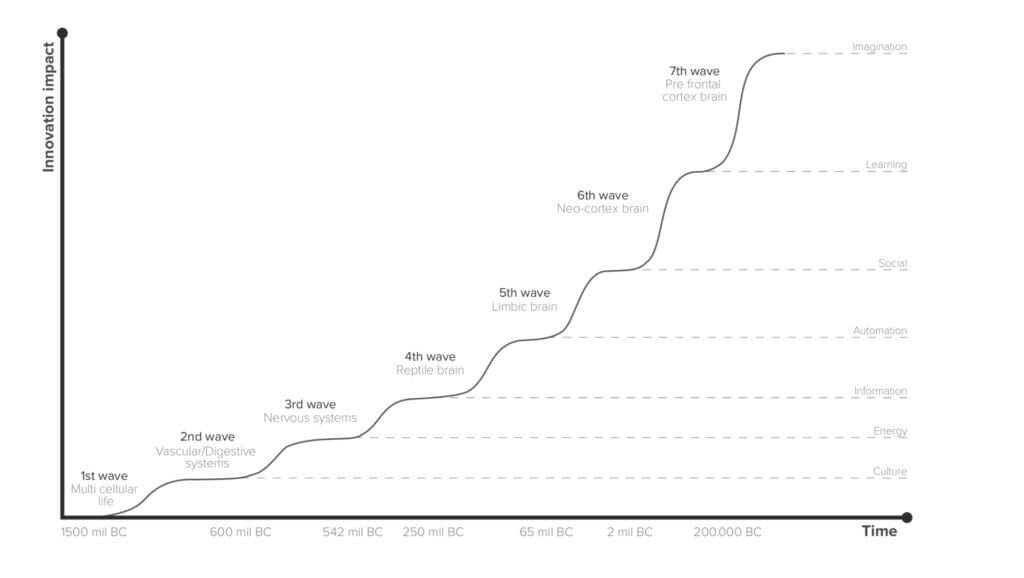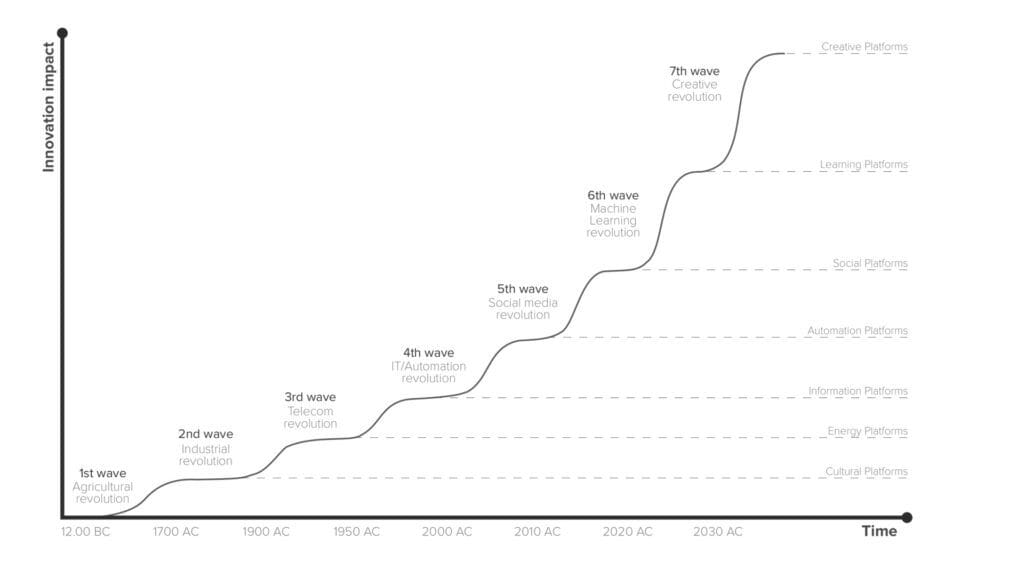Would you like to get notifications from Christian?
Welcome to an exhilarating era where Artificial Intelligence (AI) is reshaping our world! As a Futurist Keynote Speaker and Senior Research Fellow at The Conference Board, I'm thrilled to guide you through the dynamic landscape of AI. This is more than a technological revolution; it's a journey that intertwines the very essence of nature and human ingenuity. The AI revolution has just started.
AI is not a standalone marvel. It's part of a grand evolutionary process, echoing natural patterns. Just as single cells form complex organisms, humans use technology to create sophisticated systems. AI's emergence is a testament to this natural progression. It's not random but a highly predictable, integral part of our societal evolution.
Our journey through the seven transformative waves reveals a compelling narrative. Each wave brings forth new biological systems to tackle the complexities of life. The sixth wave, both in biology and technology, focuses on intelligence. Here, AI emerges as a game-changer, enabling real-time learning and adaptation.

Humanification Book Illustration
AI's growth trajectory parallels human development. AI rapidly evolves from a nascent stage of understanding the world through sensors, akin to a child's initial interactions, to mastering language and decision-making. It's a journey from reactive understanding to proactive decision-making, reshaping our interaction with technology.

Humanification Book Illustration
AI's growth follows an S-curve, beginning with slow, foundational developments. As ecosystems mature, growth becomes exponential. We're at this tipping point, ready to witness AI's unprecedented expansion. Eventually, as with any technology, this growth will plateau, integrating seamlessly into our daily lives.
As we enter the exponential phase of the AI S-curve, advancements are breathtaking. Large language models like ChatGPT and Google Bard exemplify this rapid evolution. AI's ability to process and generate complex language patterns transforms how we interact with technology. Natural language is becoming the new interface, a significant leap towards human-centric technology.
Looking ahead, AI will grow in sophistication, understanding not just text but a spectrum of sensory data. It will transition from supporting roles to making critical decisions in business and beyond. The rise of edge AI computing will further propel AI's capabilities, bringing advanced processing power to our fingertips.
As AI becomes more integrated into our physical world, it's crucial to maintain a balance. Decisions on what remains human-driven and what AI can manage will shape our future. This synergy between human intuition and AI's analytical prowess is the cornerstone of a harmonious technological future.
The journey through AI's evolutionary path is a transformative experience. From its humble beginnings to a future filled with endless possibilities, AI is not just a technological trend; it's a pivotal force reshaping every aspect of our society. Join us in embracing this change, which promises a harmonious future where technology and human potential converge.
Thank you for tuning in to this exploration of AI's transformative impact. Stay connected for more insights into how AI continues to redefine our world.
Author: Christian Kromme
First Appeared On: Disruptive Inspiration Daily
Do you want more of this kind of content? Subscribe to my 'Disruptive Inspiration Daily' newsletter. Do you find this content inspiring? Give it a 'like' or share the article with your network.
Which keynote best fits your needs?


Christian is a futurist and trendwatcher who speaks about the impact of exponential technologies like AI on organizations, people, and talents. Christian tailors his presentations to your audience's specific industries and needs.



Our world is changing at an exponential rate! A big tidal wave of digital transformation and disruption is coming at us fast. Many organizations see this wave as a threat and experience stress, but there are also organizations that just see this wave as an opportunity.

Imagine sitting with just 10-15 fellow executives at a premier location, gaining clarity on the impact of AI on your industry while enjoying an exquisite dining experience. These are not just meetings—they are transformative moments that will shape the future of your organization



In the future, 3D printing and generative design will allow for products to be designed in a more decentralized manner, and production will take place closer to the customer and fully on-demand. 3D printing technology will also allow for more customization and personalization of products.


The agricultural industry is ripe for disruption. Robotics, AI, and IoT are all technologies that have the potential to radically transform the way we grow food. In combination with vertical farming, these technologies could increase the efficiency and quality of agricultural products.

A human-centered society is one that puts people first and where technology is used to unite and empower people. It is a society that values biological life and dignity above all else. It is a society that recognizes the importance of human relationships and works to strengthen them. In a human-centered society, all members of the community are valued and treated with respect.


The future of healthcare is here. New technologies like AI, IoT, big data, and smart sensors make it possible to become the CEO of your own health. Imagine that your phone can listen to your voice and AI algorithms can detect small nuances in the tone of your voice that indicate specific diseases.
